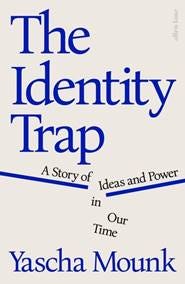
It’s the far right’s turn now to force Americans to bend the knee. Allegations of anti-Jewish racism have replaced allegations of anti-black racism as the casus belli.
Once college administrators were berated for their supposed complicity with Zionism and white supremacy. Now Trump is threatening to freeze $2.3bn in federal funds to Harvard and revoke its tax-exempt status because it claims that the university failed to protect Jewish students.
Where once activists terrorised private businesses and publishers for real and imagined crimes against progressive orthodoxy, now Trump demands that private law firms bow to the will of the counter-revolutionary state.
Both sides police language for signs of heresy. Once, people in liberal institutions displayed their pronouns if they knew what was good for them. They were told to stop saying "master bedroom," "breastfeeding," "manpower," and "brown-bag lunch," and to start saying "primary bedroom," "chestfeeding," "workforce," and "sack lunch."
Now the coppers are conservatives, and the Atlantic reports that nervous civil servants are scrubbing “equity,” “gender,” “transgender,” “nonbinary,” “pregnant people,” “assigned male at birth,” “antiracist,” “trauma,” and so on from government websites.
Meet the new boss, same as the old boss. Except this time the new boss rules with the power of the US presidency.
The Lowdown podcast this week is the second instalment of my talk with the philosopher A.C Grayling, the author of Discriminations: Making Peace in the Culture Wars. He is a fascinating and unusual thinker.
On the one hand, he sees the “woke” movement that arose in the US in the 2010s as an unproblematic continuation of progressive concerns that go back to the origins of the anti-slavery movement in the 1780s.
On the other, he deplores the left’s cancel culture campaigns, which have, leaving all moral considerations aside, been an absolute gift to the right.
As he says authoritarian leaders are now taking the opportunity to roll back rights across the world.
Part One of the interview is here
You can listen to the second episode on Apple
On Spotify
And all other players via this link
I disagree with Grayling’s assertion that there was nothing disconcerting about woke ideology, and the only problem was the heresy hunts. On the contrary I believe the ideology led to heresy hunts and persecutions because its roots lay in sources that were profoundly suspicious of liberal values.
If you follow Foucault, critical race theory and post-colonial thought, and see human rights, elections, legal protections against racism as swindles that hide privilege, you will not respect liberal freedoms when you have power to censor and control.
No one would say that Donald Trump is a natural continuation of traditional conservatism, for instance.
I tried to explain in this piece why, mutatis mutandis, you should not see wokeness as a natural continuation of progressive politics.
The roots of wokeness
There are two dishonest conversations about wokeness, or identity politics if you prefer the less contentious term. The first from conservatives is wearily familiar. For some on the right “woke” is now a synonym for “anything I can’t abide”. Overuse has made the insult meaningless.
On the left, the dishonesty lies in the denial that a new ideology even exists. Nothing has changed, we are told. To be what Conservatives sneeringly call “woke” is simply to be a decent person who cares about the rights of others as progressives have always done.
“They’re calling you ‘woke’ if you call out bad things,” cried the actress, Kathy Burke. “If you’re not racist, you’re woke. If you’re not homophobic, oh, you’re woke. Be woke, kids. Be woke. Be wide awake and fucking call it out.”
At least Burke had the self-confidence to use the word. Elsewhere in leftish circles uttering “woke” is frowned on. The censure comes even though, unlike so many political labels, “Tory” or “suffragette” or “queer,” for instance, “woke” did not begin life as an insult, but as an authentic African-American injunction from the 1930s to stay alert to injustice.
We should be able to accept that, just because conservatives use “woke” as a catch-all insult, does not mean that a distinct and peculiar version of leftism did not grow up in American universities at the beginning of the century and then went on to take over large sections of the rich world’s left in the 2010s.
Among the many achievements of Yascha Mounk’s The Identity Trap is that he unearths the roots of today’s ideology with the patience of an archaeologist. Mounk calls it the “identity synthesis” – he avoids the word woke, perhaps wisely – and does a superb job of showing how unstable and authoritarian the woke worldview was always going to be.
“The lure that attracts so many people to the identity synthesis is a desire to overcome persistent injustices and create a society of genuine equals,” the political scientist writes. “But the likely outcome of implementing this ideology is a society in which an unremitting emphasis on our differences pits rigid identity groups against each other is a zero-sum battle for resources and recognition”.
In other words, it’s all very well building your hopes on a rainbow coalition of marginalised groups. But do you know what to do when the colours of your rainbow clash?
The emphasis on difference is the glaring difference between 21st century identity politics and all versions of leftism that preceded it. From the determination of the French revolutionaries to tear down the distinction between the aristocracy and the rest of society onwards, a marker of left-wing politics has been a universalist desire to eradicate the penalties brought by class, gender or ethnicity.
As for today’s left, at least in its identitarian variant, well, let us pick from one of countless examples available to Mounk to show how that desire for equality has vanished.
Keep reading with a 7-day free trial
Subscribe to Writing from London to keep reading this post and get 7 days of free access to the full post archives.



